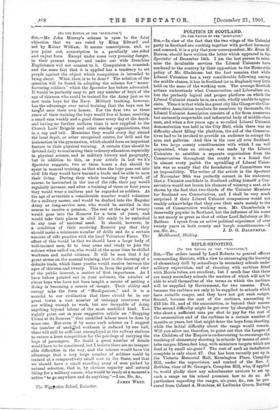rrn TIM EDITOR OF TEE "SPECTATOR."] Srs,—Mr. John Murray's scheme
is open to the fatal objection that we are ruled by King Edward and net by Kaiser William. It means conscription, and, as you point out, ccnscription in a peculiarly one sided and unjust form Except under some very pressing danger, in- their present temper and under our wide franchise Englishmen will not consent to it. Compulsion is resented, and the mere -fact that it is 'applied has a tendency to set people against the object which compulsion is intended to bring about. What, then, is to be done ? The solution of the question will be found in adopting the scheme for "manu- facturing soldiers" which the Spectator has before advocated. It would be perfectly easy to get any number of boys of the age of thirteen who could be trained for the Army just as we now train boys for the Navy. Military training, however, La s the advantage over naval training that the boys can be tauglit near their own homes. For the first two or three years of their training the boys would live at home, receiving a small sum weekly and a good dinner every day at the depot, and having no farther uniform than is now supplied to the Church Lads' Brigade and other similar organisations, that is, a cap and belt. Meantime they would every day attend the local depot, or other recognised centre, for drill and for instruction in the gymnasium, which should form an important feature in their physical training. A certain time should be devoted daily to continuing their ordinary education, especially in physical science, and in military history and geography, but in addition to this, as your article in last we k's Spectator suggests, two or three hours a day should be spent in manual training, so that when the boys pass out into civil life they would have learned a trade and be able to earn their living. During their whole training they would, of course, be instructed in the use of the rifle, their pay would regularly increase, and after a training of three or four years they would wear a uniform and be regarded as soldiers. At the age of seventeen a considerable number would volunteer for a military career, and would be drafted into the Regular Army as long-service men, who would be entitled in due course to receive a pension. The rest at the age of twenty would pass into the Reserve for a term of years, and would take their places in civil life ready to be embodied in any case of national need. It should, however, be a condition of their receiving Reserve pay that they should make a minimum number of drills and do a certain amount of rifle practice with the local Volunteer Force. The effect of this would be that we should have a large body of well-trained men; fit to bear arms and ready to join the colours when called on, who would at the same time be skilled workmen and useful citizens. It will be seen that I lay great stress on the manual training, that is, the learning of a definite trade, which these youths would receive between the ages of thirteen and twenty. This is, from the point of view of the public interest, a matter of first importance. As I have before pointed out in your columns, the number of clever boys who have not been taught a means of getting a living is becoming a source of danger. Their ability and
energy take the form of "Hooliganism," and it is a scandal to our civilisation that there should be in our great towns a vast number of unhappy creatures who are willing enough to work, but are incapable of doing anything beyond labour of the most unskilled kind. You rightly point out in your suggestive article on "Stopping Crime at its Sources" that unskilled labour must be done by some one. But even if by some such scheme as I suggest the number of luiskiled workmen is reduced by one half, there will still be sufficient unemployed at the railway stations to ensure a keen competition for the privilege of carrying the bags of passengers. No doubt a great number of details would have to be considered, but I believe there are no insuper- able difficulties in the way, and the scheme would have the advantage that a very large number of soldiers could be trained at a comparatively small cost to the State, and that we should have a small standing army of men picked by natural selection, that is, by obvious capacity and natural liking for a military career, who would be ready at a moment's natice "to go anywhere and do anything."—I am, Sir, &c., Tly Tcryg,e8lo4 S.chool, Leicceler. Itxxs WENT.










































 Previous page
Previous page